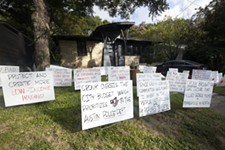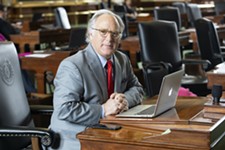As Early Voting Ends, Here's What We're Watching in Austin's Nov. 2 Election
Proposition A PACs finance reports and what's on the ballot for outlying areas
By Mike Clark-Madison and Austin Sanders, Fri., Oct. 29, 2021
Early Voting: Could Be Worse
As the Chronicle goes to press on Wednesday, Oct. 27, with three more days of early voting to go in the November 2 election, Travis County turnout through Tuesday stands at 6.72%, or just over 57,000 votes cast. Normal local campaign rules of thumb would suggest that a last rush of early voters, plus the Election Day vote, will equal or exceed that total, bringing total turnout for this off-year election into the 14-15% range. Is that good? For democracy, probably yes. For Proposition A, by far the most hotly contested item on the ballot, it's unclear. It doesn't look like initial projections of an unusually high off-year turnout, driven by the Prop A juggernaut, have come to pass, but in an election like this, everyone is an "unlikely" voter, so we'll just have to see whose get-out-the-vote game was more on point. There's certainly no shortage of resources to devote to the task...
Prop A: Both Sides Top $1M
The political action committees campaigning for and against Proposition A each raised more than $1 million between Sept. 24 and Oct. 23. According to campaign finance filings, Equity PAC, which opposes the police staffing initiative, pulled in $1,064,727 and spent $762,126 over the reporting period, while Save Austin Now PAC, which drafted Prop A and gathered signatures to qualify it for the ballot, raised $1,013,897 and spent $1,021,114.
Nearly half of Equity PAC's funds came as a $500,000 contribution from the Open Society Policy Center, a nonprofit founded by billionaire George Soros, delivered on Oct. 12. Open Society has provided financial support to progressive causes around the world, such as Missourians Organizing for Reform and Empowerment, active in the Ferguson uprisings of 2014. The PAC funding the No Way on Prop A opposition coalition also received $10,000 on Oct. 7 from the Movement Voter PAC, a progressive campaigning group formed in 2016. The Fairness Project, a nonprofit supporting progressive local and state ballot measures such as Medicaid expansion in Florida, Oklahoma, and Missouri, contributed $200,000 to Equity PAC on Sept. 27 and has since made about $44,000 in in-kind contributions to the campaign (mostly for research and other staff time). Equity PAC has also received about $54,000 in support from various labor groups, including $25,000 from AFSCME, the union that represents civilian city employees.
Meanwhile, SAN received a $100,000 contribution on Oct. 13 from America 2076, a nonprofit incorporated in 2019 that has not done much work publicly. According to the OpenCorporates online database, its directors include Austin billionaire and National Instruments founder James Truchard and his wife, Marcia. Other local high-rollers writing checks to SAN include car dealer Roger Beasley ($50,000); outgoing Whole Foods CEO John Mackey, an outspoken libertarian ($10,000); commercial real estate broker Kent Lance ($25,000); and Gigafund co-founders Stephen Oskoui and Luke Nosek ($50,000 each). Various law enforcement associations across Texas together donated around $23,000...
In the Outlying Areas
Austin voters don't have any council races or big bond or tax-rate packages to consider this time – wait 'til next year – but some of our neighboring communities have important questions to decide now. Starting in the north, Georgetown has a contested city council race for the seat that covers the Old Town and is also holding its last local option election to allow alcohol sales citywide, prompted by plans for a new H-E-B in what's now a dry precinct. Both Georgetown and Lago Vista have slates of charter amendments up for voter review, as does Pflugerville, which has two contested council races in which the Travis County Democratic Party has gotten involved. In Manor, Mayor Pro Tem Christopher Harvey is the favorite to move up to the top spot. And in the small cities of Austin's inner southwest, Rollingwood, West Lake Hills, and Sunset Valley are all going to the voters to seek reapproval of their existing sales taxes to provide for maintaining their local streets.
Got something to say on the subject? Send a letter to the editor.










